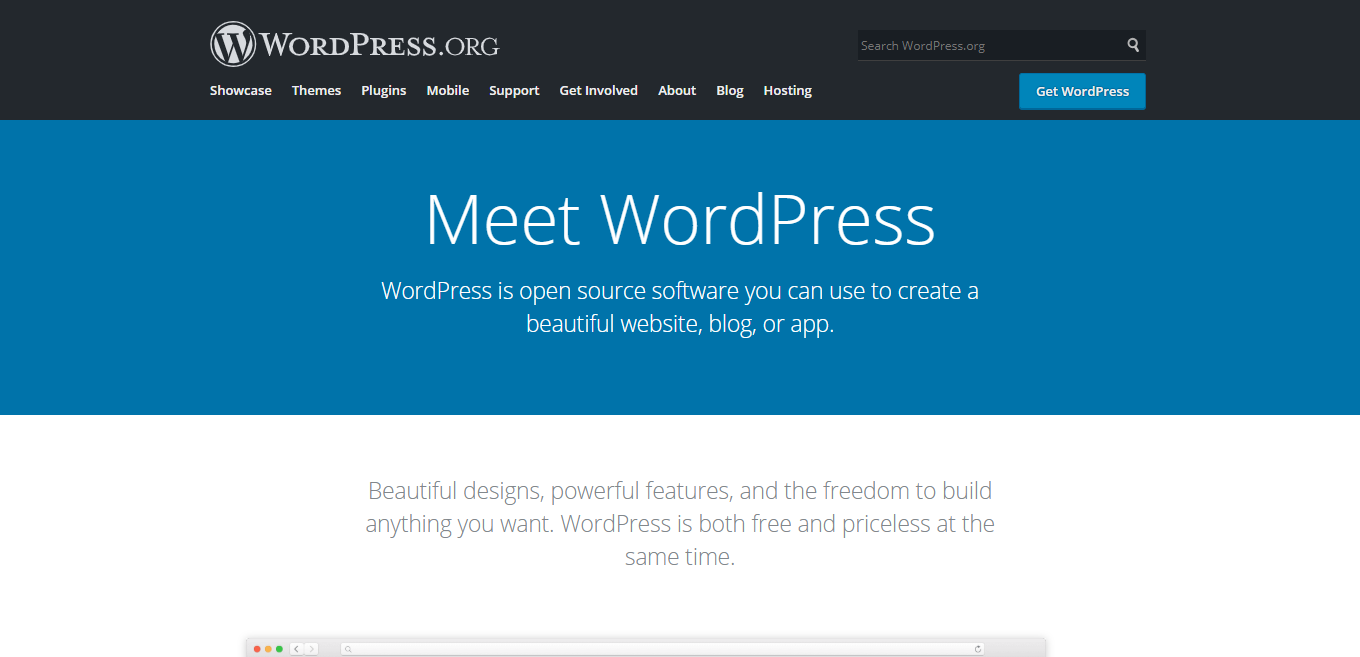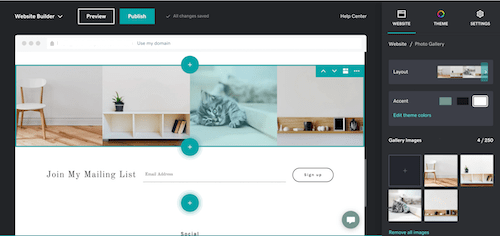When it comes to starting your own website, there are a lot of different terms you might learn about, like website platforms, hosting, content management systems and more. In fact, it might all seem confusing or overwhelming. You’re probably even curious as to why you should know these terms, and if you need them, especially when it comes to starting your own website. In this article, you’ll learn what website platforms are, some of the terms associated with them and what steps you need to take toward choosing a web host. In the end, hopefully it helps you choose what website platforms you need for your website.
What are website platforms?
A website platform is the magical technology on which websites function. Most websites operate using several types of platforms including:
- A web hosting platform
- Programming languages
- Website building tools
All of these work hand-in-hand to power your website, so you can bring visitors your business’s best online experience.
Web hosting platform
There are a lot of web hosts offering different types of platforms. These are the very technical tools that can handle websites in different ways, whether it’s speed or being able to scale the site if your website is growing or needs specific functions that simpler technology coding can’t handle.
Most web hosts offer two types of operating systems: Linux and Windows.
Linux
When it comes to hosting, Linux-based operating systems are usually great for the website owner who needs a simpler site, like a blog, small ecommerce site, personal site or portfolio.
This type of operating system is great for beginners, as some of the software built for Linux hosting allows for installing easy-to-use dashboards, like cPanel, that help the user set up email accounts, manage databases, and even install scripts for blogging, ecommerce and more.
Windows
While it’s more than possible to run smaller sites, a Windows operating system is most often used by larger scale businesses.
These types of sites are developed using software such as Microsoft ASP.net and MSSSQL database, which are specific to Windows.
As a note, Windows has a dashboard called Plesk, which has similar features to cPanel.
Programming languages

Both Linux and Windows operating systems feature different types of programming languages. These programming languages give the website developer options in building a website to perform better, but also for the beginning user to utilize what is built into the system.
Some common programming languages used in web hosting include:
- PHP
- ASP.net
- C++
- Python
- JavaScript
- Java
Related: What’s the right web hosting plan for me and my clients?
PHP
PHP is short for hypertext preprocessor, and was designed more for web based projects.
PHP can generate HTML for web pages, process forms and much more. An example of a project that uses PHP is the content management system known as WordPress.
ASP.net
ASP.net is a server-side web application framework developed by Microsoft that is used to build websites.
C++
C++ is an extension of the C programming language and is used for a lot of general purpose programming, that usually is used in the infrastructures of large systems, and resource- and performance-intensive applications. Some examples where C++ are used include video games and telephone switches.
Python
Python is a high-level programming language. Like C++, it is also used in large-scale projects, but can be seen in smaller things like building a calculator or building a desktop notification app.
JavaScript
JavaScript, especially when it comes to websites, is seen used alongside HTML and CSS. It is a language used in web browsers.
An example of a functionality that JavaScript can do, is smoothly working drop-down menus in your website’s navigation menu.
Java
Java, not to be confused with JavaScript, is a programming language used in a lot of software and app development. It’s a little like C programming and C++, but has lower-level resources. In fact, Java’s coding was influenced by them as well.
Was that still confusing? What’s the difference? Both Windows and Linux can handle most of the programming languages listed, but only Windows can handle ASP.net.
However, if you’re a beginner and just need to get the bare essentials going for your website, then don’t worry about programming languages because:
Both Linux and Windows support the things most commonly used for websites: HTML, PHP and MySQL.
For most website owners, you’re going to want the ability to use HTML, PHP and MySQL when developing your site.
Website building tools
So far, this article has only touched on the hosting end of things, not the parts that you will be handling the most, like the website building tools you need to get your website all prettied up and running.
Examples of website building tools are:
- Developmental platforms
- Content management systems
- Templated website builders
Related: How to choose the best website builder for your business
Developmental platforms
If you’re a developer who has specific needs, but you don’t want to use any available content management systems, you can use this method to build your website.
Development platforms involve using some programming languages, like ASP.net and PHP. The code works together with storing information to a database. This information can be things like blog posts, ecommerce products and much more.
This code is also found in content management systems.
Content management systems

A content management system, which is also well known as a CMS, is a specially developed software that allows you, the website owner, to build most types of websites, from blogs to ecommerce to business sites, and even more.
This is not to be confused with an operating system, as a CMS is not a web hosting server, but merely the individual website.
Popular examples of CMS are WordPress, Drupal, and Joomla, which are versatile in building most types of websites and are quite popular for bloggers and small business websites.
Of these three, WordPress is considered the most user-friendly and easiest to learn, which might be why it’s being used by more people around the world—about 35% of the web as of July 2020.
Many CMS, like WordPress, contain a “what you see is what you get” (WYSIWYG) and block editor called Gutenberg, as well as your choice of hundreds of thousands of themes to change the look of your site. Additionally, they are built with tons of plugin options that add dynamic content, such as forms, ecommerce functionality, SEO tools, social media sharing capabilities and much more.
Of course, there are other CMS, but they might be optimized for things like ecommerce, such as Magento, OpenCart, PrestaShop, and Zen Cart.
However, it can possibly be more difficult to customize the design and a bit harder for the average or basic level user to learn.
Templated website builders

Templated website builders are pre-built website designs that you can customize to fit your business.
Some of these website builders come with prebuilt generic content, so you can just switch out images and your own text content, and have a site up and running in a jiffy. Another cool feature that is sometimes seen, like with GoDaddy Websites + Marketing, is the WYSIWYG editor.
Now, templated website builders aren’t to be confused with content management systems, as these are initially simple websites with tools to get your business running.
Sure, they have a lot of similarities.
The web host offers this service and has designed its templated website builders with carefully selected features they know you will need to launch a website with your best foot forward.
They’ve done the work to deliver all the features you will need. With CMS, you might have to do some research on what tools you need to use. For example, in WordPress, you might want to know what plugins to use.
Why does choosing the right website platforms matter?
Now that you’ve answered the question of what are website platforms, why does it matter?
Choosing the right website platforms matters because it’s what helps power your site. From your web host’s operating system to the programming languages used, and even the website building tools you choose, they all can make the difference between your site functioning properly and efficiently — or not at all.
You wouldn’t want a broken or slow site, right?
If you choose a host based on price, you might be sacrificing quality of hosting service as your site grows in traffic.
Now what?
Now that you know more about website platforms, you’ll want to find the best hosting company for you.
With so many web hosts to choose from, the process can be daunting. Here are a few steps to help you on that journey:
- Determine what type of website you want to start.
- Create a budget.
- Research and visit different web hosting companies.
- Reach out to the web host company’s sales support if you have any questions.
Related: How to find the best hosting company
Determine what type of website you want to start
Do you need a website for a small blog or are you developing a large corporate website that includes ecommerce and needs enough server resources to scale up as the site grows—or somewhere in between?
Most web hosts offer different types of web hosting plans and different types of features.
For example, if you need to start a WordPress website and want specialized hosting created just for that CMS, you’ll probably want to choose Managed WordPress web hosting. This ends up killing two birds with one stone, as you end up choosing an operating system and website building tool that are made to work together like a well oiled machine.
Another example is if you need an ecommerce solution for your website. Depending on how many products you’re going to sell and what type of features you want to have for your shop, you might not want to choose the smallest shared hosting package.
In choosing a small package, you might end up running out of vital server resources to keep your site up, and you might end up upgrading your site far sooner than you had anticipated.
Create a budget
If you don’t have a lot of money, it’s important to create a hosting budget, no matter what type of website you are wanting to build.
For example, if you’re starting a blog, you might want to start small, with a beginner shared hosting plan. Some shared hosting plans run for a few dollars each month, which is affordable for most. You can always upgrade to a larger hosting plan, as your site grows.
Research and visit different web hosting companies
There are a lot of web host companies out there. While every single one of them, including GoDaddy, would love you to choose them, you should do your homework to make the choice that’s right for you. It is important to shop around and find the best company that suits your needs, that you also can trust to keep your website up and running.
Reach out to the web host company’s sales support if you have any questions
It’s likely that even before you purchase any web hosting, you’re going to have questions.
The worst thing to do is just to buy and ask later, and then find out you needed something different for your website.
Sales support can answer your questions and help you choose the right package that will fit for your website’s needs. Don’t be scared of asking a lot of questions.
Wrapping up
In the end, it’s important to know that the web host is actually on your side. They do want your small business to thrive, so don’t feel stuck with them, because you’re actually not.
If you feel you don’t have the resources necessary for your site to grow, your web host can help answer your questions and give you some options on what next steps you should take.
Good luck on finding the right host for you, and may your site be a success.
This article includes content originally published on the GoDaddy blog by Sean Loiselle.
The post What are website platforms? appeared first on GoDaddy Blog.




